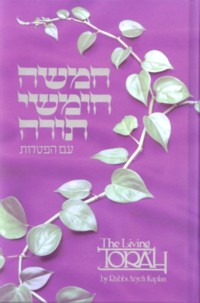As someone who feels like her understanding of the Tanakh has been too skewed by Christian interpretations, I'm interested in finding a book that provides either the main text (in English) with excessive annotations, by verse or section, or with the same, but without the text on both:
Common religious interpretations of passages, or references to common sources of commentary (so that I know where to read further)
Notes about certain long-running themes (e.g. I remember reading an annotation somewhere saying that there was a recurring theme in early portions of Genesis on boundaries between God and man)
Notes on sources of text (which I suppose might take on a more secular perspective, if you will).
Whether or not such annotation needs to come with the actual text of the Tanakh doesn't matter too much to me -- after all, there are plenty of decent English translations floating around on the internet (e.g. on the Mechon Mamre site).
Would anyone have any suggestions as to where I could look for this? I've noticed that The Jewish Study Bible seems promising -- the amount of annotation made me really happy, but I'd like to see if there are any other texts worth considering.

